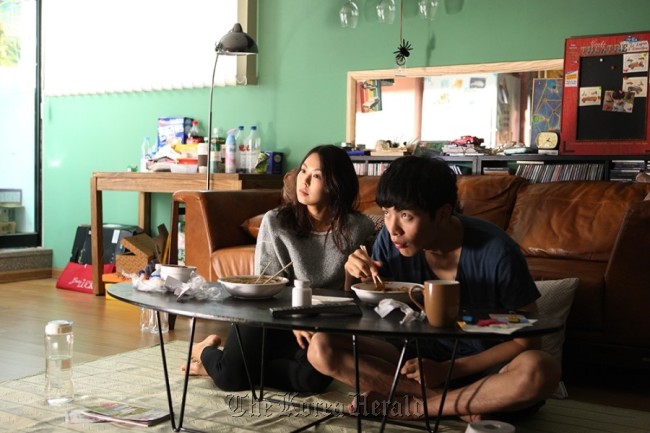One cannot be sure why film director Roh Deok calls this young couple “very ordinary,” but it is the “ordinary” post-break-up behavior that is on her mind ― or at least in her feature debut: The two get into a physical fight while drinking with their coworkers, obsessively check each other’s Facebook accounts, secretly follow their ex on their dates, and swear at each other in public.
The film, “Very Ordinary Couple,” seems to be arguing that this is what most of us, the “ordinary,” go through after a nasty break-up. While some may agree and some may not ― it’s hard to think that an average person with the least bit of common sense would purposely smash her ex’s laptop and mail it to his house ― the film manages to be an interesting expos of a romantic relationship and the repeated mistakes that gradually make it unrecoverable.
 |
A scene from director Roh Deok’s “Very Ordinary Couple.” (Lotte Entertainment) |
The film follows young bank clerks Dong-hee (played by actor Lee Min-ki) and Young (played by actress Kim Min-hee) who have just broken up with each other. They work at a local branch of Standard Chartered, and their seemingly nasty split turns scandalous in the office. After going through a period of irrational behavior, including physical fights and Young’s impulsive one-night stand with a mutual colleague at work, the two decide to give their relationship another try. Once again, they are madly in love.
The real story of the film begins as the two begin to date again, in spite of their shared doubts and fears. As the second honeymoon phase ends, the same problems ― those that had led to their initial break-up ― surface: the boredom, the trust issues, and the mutual dishonesty about what they really want. The hot-tempered Dong-hee seems like he needs an anger management class, while Young tries to avoid conflicts by telling small lies ― unaware of how lies, regardless of the motivations, can destroy trust.
Above all, the couple’s shared experience of the break-up gradually makes them insecure about their relationship. This eventually leads to a suffocating disaster: Dong-hee tries very hard to pretend that he is interested in the things Young suggests doing, only to please her and save their relationship ― although he’d really rather sleep in than go to an amusement park on his day off. Young, on the other hand, gets extremely self-conscious of everything she tells Dong-hee, as she is worried that she will upset him off by “saying something wrong” ― just like how she did before the first break-up.
There is a sadness that fills the screen as the two desperately try to save their relationship, pretending nothing is wrong and trying to believe that things will work out in the end. “I will be good to her,” Dong-hee repeatedly says in the film. “I’ll try harder to make this work.”
But watching them forcing on a smile while obviously annoyed by each other’s company, the audience can instinctively tell that the two will soon part ways ― in spite of their genuine efforts and affection for each other. The movie reaches its climax as the two flawed characters realize that they’ve messed it up again, that they can no longer be in denial, and there are some things in life that cannot be controlled no matter how hard they try.
Actress Kim Min-hee, who enjoyed much success for her role as the serial killer in last year’s thriller “Helpless,” is particularly impressive as the vulnerable Young, bringing an extraordinary depth and complexity to the character.
What is “ordinary” or universal about this film is not the post- break-up behavior: It is the repeated mistakes in relationships, helpless denials, as well as the wounding power of love ― those strange, sad, bizarre moments that transform lovers into who they are, even after they part ways.
By Claire Lee (
dyc@heraldcorp.com)








